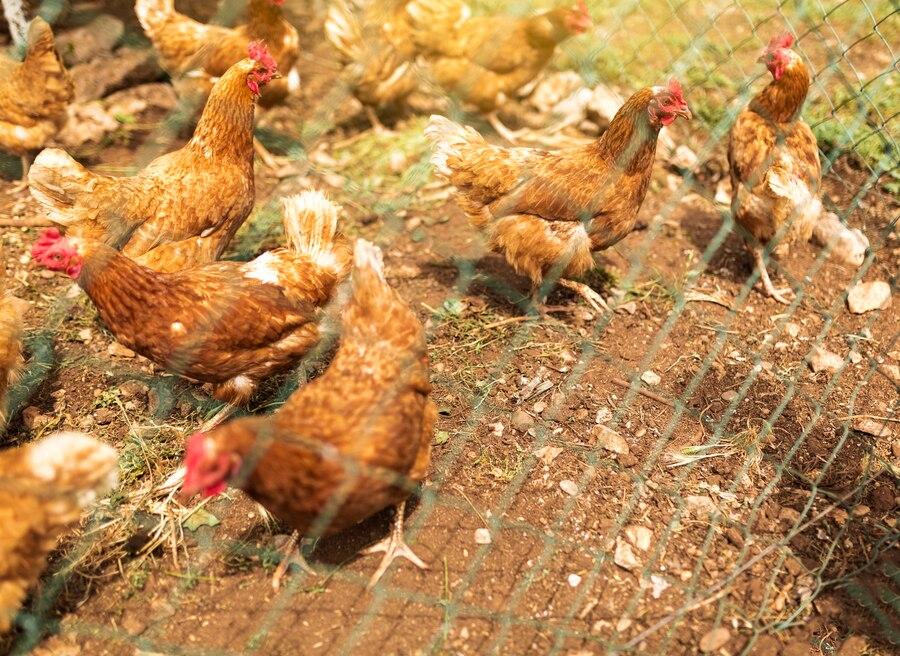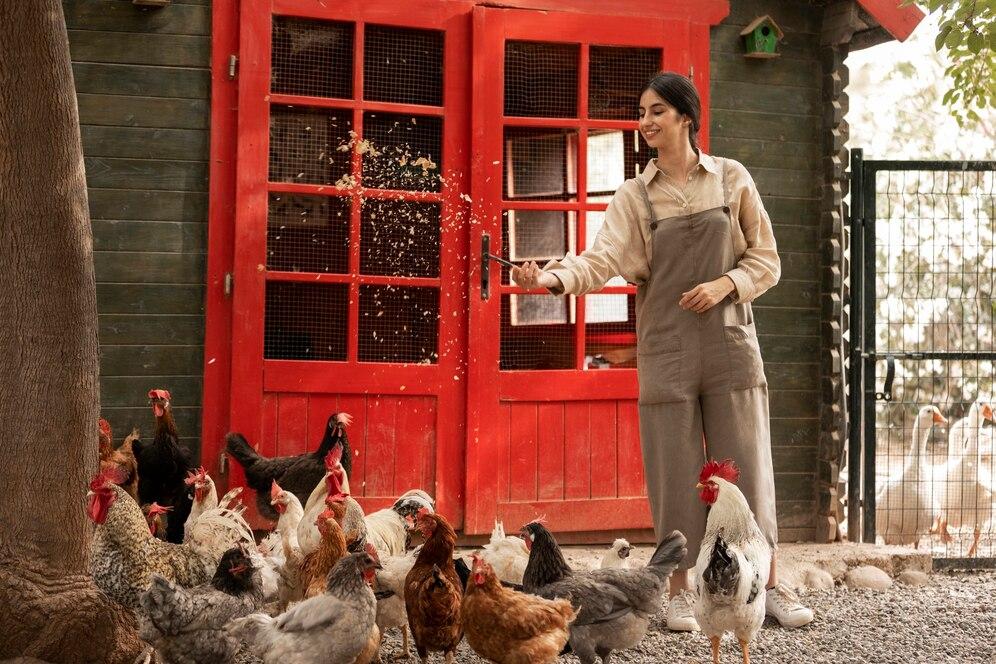Imagine a garden buzzing with life, free from pesky insects and brimming with fresh produce.
Chickens can transform your garden into a vibrant, pest-free haven.
They offer natural pest control, enrich the soil, and provide fresh eggs.
This guide will help you integrate chickens into your garden, ensuring your plants and feathered friends thrive.
Let’s embark on this exciting journey to create a harmonious and productive backyard oasis!
Garden Guardians: How Chickens Keep Pests at Bay
Chickens are natural pest controllers and love munching on various garden pests. Here are some of the most common pests that chickens typically eat:
- Insects: Chickens have a keen eye for insects. They will happily gobble up beetles, grasshoppers, and crickets. Their constant foraging helps keep these pesky insects in check.
- Slugs and Snails: These slimy garden invaders are a favorite chicken snack. By eating slugs and snails, chickens help protect your plants from these common pests.
- Grubs and Larvae: Chickens scratch the soil to uncover grubs and larvae in the immature stages of many garden pests. This provides a protein-rich treat for the chickens and disrupts these pests’ life cycle.
- Aphids: While chickens may not always target aphids directly, they eat the ants that farm them. This indirect control can help reduce aphid populations in your garden.
- Weeds and Weed Seeds: Chickens also peck at weeds and their seeds, helping to reduce unwanted plant growth. This natural weeding can save you time and effort in maintaining your garden.
Incorporating chickens into your garden creates a dynamic ecosystem, contributing to effective pest management.
Top Chicken Breeds Perfect for Your Backyard Garden
For raising chicks, consider using a cozy nursery to ensure they grow healthy and strong.
When choosing chicken breeds for their foraging abilities, you want breeds that are active, curious, and excellent at finding their food.
These breeds help control pests and also reduce your feed costs. Here are some top breeds known for their foraging prowess:
- Rhode Island Reds: These chickens are hardy and adaptable, making them great foragers. They thrive in various environments and are known for their ability to find food independently.
- Leghorns: Leghorns are energetic and constantly on the move. Their active nature makes them exceptional foragers, particularly good at finding insects and seeds.
- Sussex: Sussex chickens are friendly and curious, constantly scratching around for food. They are efficient foragers and do well in free-range environments.
- Australorps: Known for their calm demeanor, Australorps are also excellent foragers. They diligently search for food, making them a great addition to any garden.
- Plymouth Rocks: These robust and versatile chickens are good layers and proficient foragers, helping keep your garden pest-free.
Choosing any of these breeds will ensure you have productive chickens that contribute significantly to maintaining a healthy, pest-free garden.
Chickens vs. Pesticides: Which is More Effective?
Chickens offer a natural and effective way to control pests in your garden.
Unlike chemical pesticides, chickens provide a sustainable solution that doesn’t harm the environment.
They actively hunt and consume a variety of garden pests, including insects, grubs, and even small rodents.
This reduces the need for harmful chemicals and promotes a healthier garden ecosystem.
Chickens are particularly effective at controlling pests like:
- Beetles
- Grasshoppers
- Slugs
- Snails
Additionally, chickens can reach areas difficult for other pest control methods to cover, such as under dense foliage or in tight garden corners.
Conversely, chickens integrate seamlessly into your garden’s ecosystem, offering a hands-off approach to pest management.
| Expert Tip: Create chicken-free zones by using fencing or netting to protect your garden from chickens. Use raised beds to keep plants out of reach. |
|---|
Safeguard Your Garden: Tips to Keep Chickens from Damaging Plants

You can employ various effective methods to keep chickens away from certain plants. These strategies ensure your garden remains lush and your chickens stay happy.
Fencing and Barriers
Install low fences or barriers around delicate plants. Chicken wire or meshworks wonders. These barriers prevent chickens from scratching and pecking at their prized plants.
Chicken Tunnels
Create designated pathways or tunnels for your chickens. These “chunnels” guide them through the garden without giving them access to your plants. It’s a win-win: they get to forage, and your plants stay safe.
Plant Protection
Use cloches, plant cages, or row covers to shield individual plants. These protective covers keep chickens at bay, allowing sunlight and rain to nourish your plants.
Decoy Plants
Plant chicken-friendly herbs and greens in a separate area. Chickens love munching on clover, dandelion greens, and chickweed, so by providing these tasty treats, you can divert their attention from your central garden.
Mulch and Ground Covers
Spread mulch or ground covers around your plants, such as straw or wood chips.
Chickens find it harder to scratch through these materials, reducing the risk of plant damage.
Motion-Activated Sprinklers
Install motion-activated sprinklers in your garden. These devices startle chickens with a gentle spray of water, training them to avoid certain areas.
Training and Supervision
Train your chickens to avoid specific plants. Use treats to reward them for foraging in designated areas. Supervise them during free-range time to reinforce good behavior.
These methods let you enjoy a thriving garden and happy, healthy chickens.
Perfect Pest Control: How Many Chickens Does Your Garden Need?
The number of chickens needed for effective pest control depends on several factors:
- Consider the size of your garden.
- More pests may require more chickens.
- Active foragers like Rhode Island Reds or Leghorns are more effective.
- Avoid overcrowding to keep chickens healthy.
- Ensure you can manage their care and maintenance.
Considering these factors, you can maintain a healthy, pest-free garden with the correct number of chickens.
| Tip: Designate scratching and dust-bathing areas to keep chickens entertained, and place feeders and waterers away from garden beds. |
|---|
Healthy Gardens and Happy Chickens
Creating a delightful and pest-free garden with backyard chickens is rewarding and practical.
Chickens naturally control pests, enrich the soil, and provide fresh eggs.
Choose the suitable breeds, feed them well, and protect your plants to maintain a harmonious garden.
Follow these tips to enjoy a vibrant, productive garden and happy, healthy chickens.








